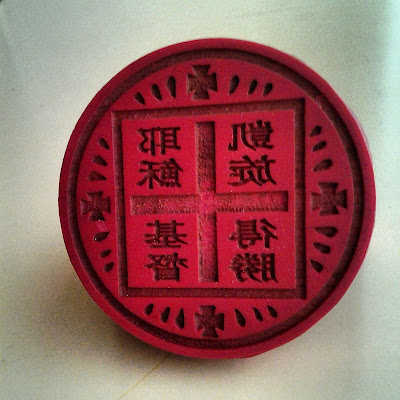I remember having a conversation many years ago with a friend of mine about the movie, Dogma. This movie was causing quite a stir because it blatantly mocked and tried (but failed) to repudiate basic Christian teachings. I had not seen the movie so I was dependent upon my friend to fill me in on what people found objectionable. Because I had not seen it, I really could not provide much for the conversation. I can't remember all the points he made, but I do remember this very poignantly: "Those with a strong faith will laugh at it; those with a weak faith will be repulsed by it." Those may not be the exact words of my friend, but you get the idea.
I finally did see it, years later. I remember one scene in particular where Chris Rock, playing the so-called "13th apostle" says that the Virgin Mary giving birth to Christ is true but that believing she was ever virgin (semper virgo for you Western Riters out there) was due to just plain gullibility. I suppose that in the minds of the writers of Dogma, a virgin birth of God in the flesh is way more believable than a married couple refraining from intercourse since obviously that NEVER happens, right?
Those who hate Christ and His Church will always try to find ways to destroy the faith and the faithful. This should come as no surprise. Most recently, a papyrus fragment was brought to world attention. This small fragment, written in Coptic, dating to the fourth century, is no larger than a credit card. The contents of the papyrus say that Jesus was married and that Mary Magdalene was an apostle. Well, stop the presses! Everyone pack up your bibles and catechisms and prayer books because we've got to rewrite doctrine! Of course, not even the woman who brought this to light is saying that this is a definitive find. Numerous more tests are to be conducted to determine the document's authenticity.
I'm not going to spend my valuable time debunking the find. It's actually really easy to do when you consider that this one fragment has no corroboration in any other written source in any other written language in any other geographical area from before or after the fourth century. When a "tradition" like that has such a limited provenance, it's most likely that that particular tradition was held by a radical minority or is a forgery.
But we don't need to get into arguments related to paleography or papyrology or history or language to rebut this. We have, as Orthodox Christians, 2000 years of unbroken tradition, safeguarded by the Bride of Christ, the Church. One little papyrus fragment the size of a credit card will not bring down the Church. I don't worry about it; you shouldn't either.
Unlike the Muslims in the Middle East who work themselves into a tizzy every time their Prophet is mocked or not venerated by non-Muslims, we Christians have put up with a lot of assaults on the faith; most of us have come to accept that such is the price of admission. We bear the assaults and we should continue to do so with joy. We don't and shouldn't call for the death of those who wield the attacks.
Those who are really upset with this find are no different than those who felt threatened by the movie, Dogma or who are consistently appalled by the covers of Time, Newsweek, US News and World Report, etc. around Easter time, when those periodicals feel the need to convince the Christian faithful that what some "scholar", who lives in his mom's basement, thinks should make them throw out what they believe. Bottom line: Those offended people have a weak faith.
Not the gold standard. . .
7 hours ago



